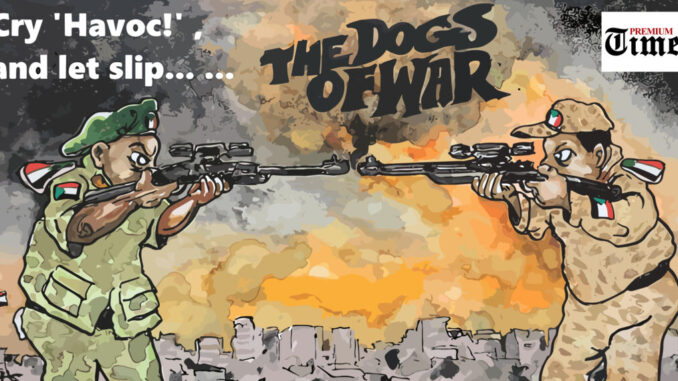
hankfully the Nigerian authorities got it right this time, or somewhat, with the evacuation of over 500 Nigerians out of the ongoing mess in Sudan, and talks are out there that other batches of evacuees would soon be home-bound. Air Peace, Azman, and Max Air, in a rare act of private sector air carrier leadership of blood over profit, self-coordinated and made the evacuation possible.
Not your typical milquetoast this time, Geoffrey Jideofor Kwusike Onyeama, the minister of Foreign Affairs, impressively worked the phones and gave diplomacy a buoy, enabling the Saudis, Egyptians and Addis Ababa to allow traumatised and fleeing Nigerians get an initial resting place before they could be sent home.
![First batch of Nigerian evacuees from Sudan arrive Abuja [Photo credit: Chiamaka Okafor/Premium Times]](https://media.premiumtimesng.com/wp-content/files/2023/05/IMG_1701-1-scaled.jpg)
Delightfully too, Onyeama’s gesture added a soothing vanish on the garish dents left on the nation’s image from the now famous showboating of Abike Kafayat Dabiri-Erewa, who heads President Muhammed Buhari’s Diaspora Commission, and the flabby response of the Humanitarian ministry.
Yet, the tragedy unfolding in the Sudanese capital, Khartoum, where, according to international press accounts, already over 500 have been killed and no fewer than 100,000 now face a humanitarian crisis, has wider ramifications beyond the evacuation of Nigerians. With about seven international borders and a river that gives life to 10 countries, a full-scale war in Sudan – and we are just an inch to that – could have immediate devastating consequences in north, central and east Africa.
It is tempting to locate the roots of the current crisis in Sudan to the October 2021 coup that set up the tense relation between the Sudanese Armed Forces led by Abdelfattah Al-Burhan and the Rapid Support Forces (RSF), a paramilitary force led by Mohamed “Hemedti” Haman Dagalo, over how to integrate the RSF into the regular army ranks.
![The 2nd batch of Evacuees: 130 Nigerian nationals; 128 females and 2 males that departed Port Sudan International Airport landed at Nnamdi Azikiwe International Airport Abuja at 3:15 pm via Tarco Airline B737-300 Aircraft. [PHOTO: TW @nidcom_gov]](https://media.premiumtimesng.com/wp-content/files/2023/05/FvXDnYhX0AAc9sn-e1683441461359.jpg)
Sudan’s crisis, however, has complex ethnic and Islamic roots dating to the Mahdist Movement of the 19th century, which challenged and ultimately prevailed over Egyptian and then British colonialism but never could resolve the stack incongruities of race and class domination. Subsequently, post-colonial Sudan deployed religion as a screen, even as the boiler plates of inequality, poverty and discrimination kept the country constantly volatile and on the edge.
It was this capacious social gorge that ultimately re-ignited the Burhan-Hemedti partnership, offering Hemedti reasons to distance himself from Al-Burhan, who he now frequently describes as “fascist” and increasingly links to former President Al-Bashir-era Islamists.
The larger issue, however, is that the potential civil war looming, sure to ripple through Sudan’s restive peripheries – embroiling countless armed groups and communal militias – should alarm the Nigerian authorities because of the conceivable destabilisation this could accelerate from the insurgency in our North-Eastern corridor and the escalation of tension in the upper cone of our North-Western states, enabled by a free flow of small arms, as was the case after the fall of Libya.
![2nd batch of Evacuees: 130 Nigerian nationals; 128 females and 2 males that departed Port Sudan International Airport landed at Nnamdi Azikiwe International Airport Abuja at 3:15 pm via Tarco Airline B737-300 Aircraft. [PHOTO: TW @nidcom_gov]](https://media.premiumtimesng.com/wp-content/files/2023/05/FvYBhxrXgAMvqwf.jpg)
Gloomily, Sudan, now the third-largest gold producer in Africa, with as much as 80 per cent of the production smuggled to Russia, has just as bad a resource curse as Libya, adequate to retain the war for years, if not decades. To save the situation, therefore, here are urgent points to address in the search for a long-term solution.
PREMIUM TIMES believes the main concern would be to address the arrogant neglect to share power, on equal terms, between Sudan’s powerful northern riverine Arab tribes, which, as the military and security aristocracy, have controlled the country and captured power since independence, with the Darfur Arabs, who are regarded as “primitive, uneducated and black”. This must commence in earnest.
Then human rights accountability calls, particularly the trial of architects of genocide in Darfur, including handing over Al-Bashir and his henchmen to the International Criminal Court, which can no longer be delayed.
Missioners for peace in Sudan must prioritise land reform between the Arab and non-Arab Muslim tribes of Darfur, particularly the Fur, the Zaghawa, and the Masalit, which was central to the revolt against Al-Bashir, whose response was unleashing the notorious Janjaweed Arab militia bandits on the non-Arab civilian population, under military direction.ⓘ
![NAF crew members after arriving with Nigerian evacuees from Sudan [Photo credit: Chiamaka Okafor/Premium Times]](https://media.premiumtimesng.com/wp-content/files/2023/05/IMG-20230504-WA0004.jpg)
The worst idea in statecraft for such a fractured polity is the pointlessness of trying to embed a religious ethos within a regular army, as the ongoing war of words between the Forces of Freedom and Change (FFC) and the RSF have alleged, of the army’s plan to restore leading Islamists to power.
PREMIUM TIMES is calling on Nigeria, as a leading voice in Africa, to urgently prepare to participate fully in the processes that will ensure the restoration of peace in Sudan. This should build on the old Abuja talks on Sudan.
The immediate priority, therefore, must be achieving a sustainable humanitarian ceasefire, while all national, regional, and international actors remain undaunted in rejecting the war.
The UN, Africa Union (AU) and the regional bloc in the Horn of Africa, the Inter-Governmental Authority on Development (IGAD), should note that the worsening situation in Sudan has implications for regional security and the security of countries contiguous to Nigeria.
END

Be the first to comment